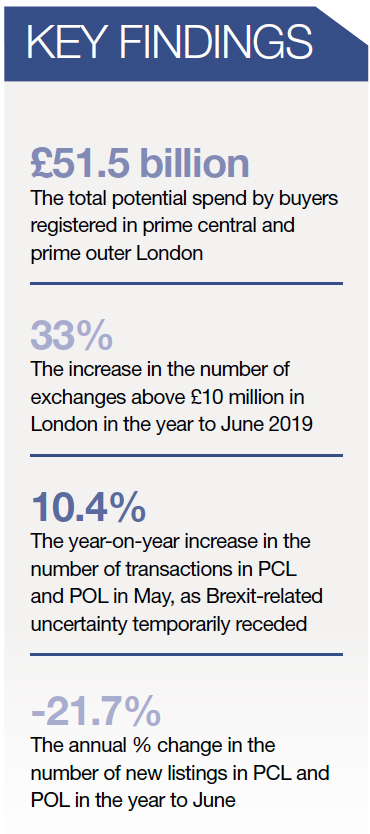The WPJ
THE WORLD PROPERTY JOURNALReal Estate Facts Not Fiction
Residential Real Estate News

Brexit Uncertainty Continues to Impact London's Luxury Property Market
Residential News » London Edition | By Michael Gerrity | August 27, 2019 9:02 AM ET
According to International property consultant Knight Frank, political uncertainty continues to have a tangible impact on sales activity in London's Prime Residential marketplace.
While the overall number of exchanges was marginally higher in the first six months of 2019 compared to the same period last year, it was not a uniform trend over the period.
 Transactions declined year-on-year in January and February, underlining the mood of uncertainty as the original Brexit deadline of March 31st approached without a political consensus on the way forward. The first failed meaningful vote on Brexit took place on January 15th.
Transactions declined year-on-year in January and February, underlining the mood of uncertainty as the original Brexit deadline of March 31st approached without a political consensus on the way forward. The first failed meaningful vote on Brexit took place on January 15th.
Between March and May, the number of exchanges increased compared to last year, reflecting how a greater degree of confidence returned as the March deadline was delayed and the prospect of a disorderly "cliff edge" Brexit receded. Indeed the rise in May was 10.4%.
However, transaction levels fell marginally again in June 2019, demonstrating how political uncertainty returned following the resignation of Theresa May at the end of May and as the Tory leadership election got underway.
The new prime minister has pledged to boost the UK economy, which should drive activity in property markets, all else being equal. Anticipating any short-term impact on pricing from a stamp duty cut, as proposed by Boris Johnson, is less straightforward given the potentially distortive effect on supply and demand.
However, such a move would reduce trading frictions and should therefore raise transactions and tax revenues in the long term.
Meanwhile, pent-up demand continues to build. The total available budget of prospective Knight Frank buyers in London rose to £51.5 billion in Q2 2019, as stamp duty-related price adjustments drove demand. Despite strong demand supply remains constrained.
The supply of new properties remains more subdued as vendors hesitate due to the political uncertainty. New listings in PCL and POL were 21.7% lower in the year to Q2 2019 than the previous 12 months.
Higher-value markets continue to outperform for reasons that include the fact price growth was more modest than the wider market between 2009 and 2015. The number of exchanges above £10m increased by 33% in the year to June 2019, compared to an equivalent 3% decline between £1m and £2m.
While the overall number of exchanges was marginally higher in the first six months of 2019 compared to the same period last year, it was not a uniform trend over the period.
 Transactions declined year-on-year in January and February, underlining the mood of uncertainty as the original Brexit deadline of March 31st approached without a political consensus on the way forward. The first failed meaningful vote on Brexit took place on January 15th.
Transactions declined year-on-year in January and February, underlining the mood of uncertainty as the original Brexit deadline of March 31st approached without a political consensus on the way forward. The first failed meaningful vote on Brexit took place on January 15th.Between March and May, the number of exchanges increased compared to last year, reflecting how a greater degree of confidence returned as the March deadline was delayed and the prospect of a disorderly "cliff edge" Brexit receded. Indeed the rise in May was 10.4%.
However, transaction levels fell marginally again in June 2019, demonstrating how political uncertainty returned following the resignation of Theresa May at the end of May and as the Tory leadership election got underway.
The new prime minister has pledged to boost the UK economy, which should drive activity in property markets, all else being equal. Anticipating any short-term impact on pricing from a stamp duty cut, as proposed by Boris Johnson, is less straightforward given the potentially distortive effect on supply and demand.
However, such a move would reduce trading frictions and should therefore raise transactions and tax revenues in the long term.
Meanwhile, pent-up demand continues to build. The total available budget of prospective Knight Frank buyers in London rose to £51.5 billion in Q2 2019, as stamp duty-related price adjustments drove demand. Despite strong demand supply remains constrained.
The supply of new properties remains more subdued as vendors hesitate due to the political uncertainty. New listings in PCL and POL were 21.7% lower in the year to Q2 2019 than the previous 12 months.
Higher-value markets continue to outperform for reasons that include the fact price growth was more modest than the wider market between 2009 and 2015. The number of exchanges above £10m increased by 33% in the year to June 2019, compared to an equivalent 3% decline between £1m and £2m.
Sign Up Free | The WPJ Weekly Newsletter
Relevant real estate news.
Actionable market intelligence.
Right to your inbox every week.
Real Estate Listings Showcase
Related News Stories
Residential Real Estate Headlines
- Las Vegas Area Home Prices Uptick 4.3 Percent Annually in March
- Single-Family Rent Growth in U.S. Trends Upward in 2025
- U.S. Mortgage Rates Tick Down Post Trump Tariffs Commencement
- President Trump's 'Liberation Day' Tariffs Potential Impact on the U.S. Housing and Mortgage Markets
- Baby Boomers Biggest Cohort of U.S. Home Buyers in 2025 as Millennials Decline
- U.S. Monthly Housing Payments Hit Record High in 2025
- U.S. Pending Home Sales Uptick in February
- Global Prime Residential Rent Slowdown Continued in Late 2024
- Ireland Home Price Inflation Hits 8 Year High in Early 2025
- Existing Home Sales in America Uptick in February
- Great Miami Area Residential Sales Decline 15 Percent Annually in February
- Mortgage Rates Uptick in Mid-March, Ending 9-Week Decline in U.S.
- World Property Ventures Builds the Future of Real Estate with New Funding Round
- U.S. Builder Sentiment Declines Amid Economic Uncertainty and Rising Costs
- Black Homeownership Rates in U.S. Enjoy Largest Annual Increase of All Racial Groups
- Wealthy Renters Are Taking Over More of the U.S. Rental Market
- If U.S. Congress Does Not Extend NFIP Soon, Thousands of Daily Home Closings Impacted
- U.S. Mortgage Applications Spike 11 Percent in Early March
- Greater Palm Beach Area Residential Sales Rise in Early 2025
- New Apartments in U.S. Are Leasing at Slowest Pace on Record
- U.S. Mortgage Rates Drop to 4 Month Low in March
- Overall U.S. Mortgage Delinquency Rates Dip in December
- New Tariffs on Canada, Mexico to Impact U.S. Homebuilder Input Costs
- Monaco's Property Market: A Tale of Two Cities
- U.S. Home Purchase Cancellations Surge, 1 in 7 Sales Getting Canceled
- U.S. Pending Home Sales Hit Historic Low in Early 2025
- Greater Miami Area Residential Sales Dip in January
- Governor DeSantis Supports Ending Property Taxes in Florida
- WPV Aims to Become the Berkshire Hathaway of Real Estate Tech
- U.S. Home Sales Slump Continues in January
- Average Americans Spend 38 Percent of Monthly Income on Mortgage Payments
- Switzerland's Safe-Haven Appeal Grows with World's Wealthy Homebuyers
- U.S. Builder Confidence Rapidly Declines in February
- Las Vegas Home Sales Rise 6.7 Percent Annually in January, Condo Sales Dip
- Homebuyer Demand in America Drops to 5-Year Low in Early 2025
- Ownership More Affordable Than Renting in Most U.S. Markets
- The World's First Global Listings Service Launches, Called a GLS
- Home Prices Continue to Rise in 89 Percent of U.S. Metros in Late 2024
- Global Luxury Residential Prices Showed Gradual Improvement in Late 2024
- U.S. Construction Hiring Rate Drops to Lowest Levels in 5 Years
Reader Poll
Marketplace Links
This website uses cookies to improve user experience. By using our website you consent in accordance with our Cookie Policy. Read More





